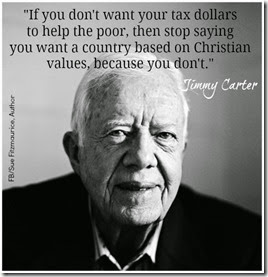by Glenn Littrell
I would venture that my Christian beliefs would not be sanctioned by most Christians. I also would suggest that my political positions, which I refer to as moderate [actually ‘bleeding heart’ moderate] would likely be rejected by most moderates who, along with conservatives and right-wingers would label me a liberal, leftist or worse. I have no problem discussing or disclosing these position individually.
I have never been a 'joiner'. As an adult the only organizations I have ever joined could be counted on one hand and to the best of my memory were all work related. I mention this because I seldom find articles, or quotes, that I can completely agree with unless they are very short. [Usually a line or two.]
Until now.
While I would not say the following illustrates either my religious beliefs or my political beliefs, I would say that it describes, very well, where my religious and political beliefs meet and merge. This merging is the most important aspect of either belief system as I could not live one absent from the other. I could not be a Christian in prayer and a non-Christian in the voting booth.
I present this information, not as a definition of ‘my position’, but as a repudiation of the ideal that only the right can be either patriotic or Christian. It is not absolute my position but it is a position I agree with.
The following is from “The Christian Left” FaceBook Group:
“ The Christian left is a term originating in the United States, used to describe a spectrum of left-wing Christian political and social movements which largely embraces social justice.
The most common religious viewpoint which might be described as 'left wing' is social justice, or care for the poor and the oppressed (see Minority groups). Supporters of this might encourage universal health care, welfare provision, subsidized education, foreign aid, and Affirmative Action for improving the conditions of the disadvantaged. Stemming from egalitarian values (and what Jesus Himself said), adherents of the Christian left consider it part of their religious duty to take actions on behalf of the oppressed.
The Christian Left holds that social justice, renunciation of power, humility, forgiveness, and private observation of prayer (as opposed to publicly mandated prayer), are mandated by the Gospel (Matthew 6:5-6). The Bible contains accounts of Jesus repeatedly advocating for the poor and outcast over the wealthy, powerful, and religious. The Christian Left maintains that such a stance is relevant and important. Adhering to the standard of "turning the other cheek", which they believe supersedes the Old Testament law of "an eye for an eye", the Christian Left often hearkens towards pacifism in opposition to policies advancing militarism.
While non-religious socialists sometimes find support for socialism in the Gospels (for example Mikhail Gorbachev citing Jesus as "the first socialist"), The Christian Left does not find that socialism alone is an adequate end or means. Christian faith is the core of their belief which in turn demands social justice.
The Christian Left sometimes differs from other Christian political groups on issues including homosexuality. This is often not a matter of different religious ideas, but one of focus — viewing the prohibitions against killing, or the criticism of concentrations of wealth, as far more important than social issues emphasized by the religious right, such as opposition to active homosexuality. In this case, similar to philosophies expressed by writers such as C.S. Lewis, these members of the Christian Left believe homosexual sex to be overemphasized when compared with issues relating to social justice, or even matters of sexual morality involving heterosexual sex. The constant right-wing focus on Homosexuality and Abortion is a focus on nothing but wedge issues. Bottom Line: We welcome all to their place at God's table.
Another Christian Lefty, Marilyn Chandler McEntyre, put it this way in her article "A Voice from the Christian Left."
Many on the Christian Right are fond of posing the question WWJD?-- What would Jesus do? I'd like to remind them what Jesus DID do: He cared for the poor. He did not condemn the woman caught in adultery. He prayed alone. He commanded us to love our enemies. He preached peace. He ate, drank, and lived with "tax collectors and sinners" -- the lowlifes and outcasts of his day, while reserving his condemnation for the religious leaders who from a place of privilege imposed their legalism and literalism on the people they were responsible for leading. He told his disciples not to oppose the healing work of those outside the ranks of his followers. And again and again he reminded us to care for the poor. (That moral issue gets more air time than any other in the gospels: 1 verse in 9.) If Christians concerned about how to respond to the grave global issues facing us all were to reread the Gospels for guidance, I think we'd find some pretty clear indications there about what Jesus would do. And what he wouldn't. (One of the few bumper stickers I've been tempted to affix to my still undecorated car in recent months reads "Who would Jesus bomb?")
Whatever Jesus would do, given what he did do, and has promised he will do, I don't think it looks much like what the insulated, self-congratulatory Fox News fans on the "Christian Right" are doing.
Marilyn McEntyre is a Professor of English at Westmont College, Santa Barbara, California.
Our Mission Statement would be meaningless if we didn't mention Christ's finished work on the cross. His birth, life, death and resurrection mean everything to us. John 3:16 For God so loved the world that he gave his one and only Son, that whoever believes in him shall not perish but have eternal life.
We at The Christian Left don't tend to march in lockstep either. The above may not even speak for all members of this group. The Christian Left is a spectrum, just as The Christian Right is one “
**************************************************
As a reformed agnostic I have yet to find a denomination or church that would coincide with my spiritual beliefs to the extent that I would ever feel comfortable enough to officially join.
The reason for this is two-fold: first I believe that any religion that does not put forward as its most important task the concepts of love, peace and social justice over worship, ritual and doctrine is a man made religion meant to serve the purpose of harnessing God for its own use, salvation or validation; secondly, while I believe churches and clergy serve many well meaning purposes I do not believe they are pre-requisites to spirituality or salvation.
I accept the fact that many will label me as not really a Christian, misinformed, or cherry picking my beliefs, but that's all right, because this isn't between me and anyone else except God.
GlennDL



![pics [5] pics [5]](http://lh5.ggpht.com/_VRwJoZ8_FWQ/TChMhAKgpzI/AAAAAAAAhS0/P8xFwi8BGTE/pics%20%5B5%5D_thumb%5B2%5D.gif?imgmax=800)












